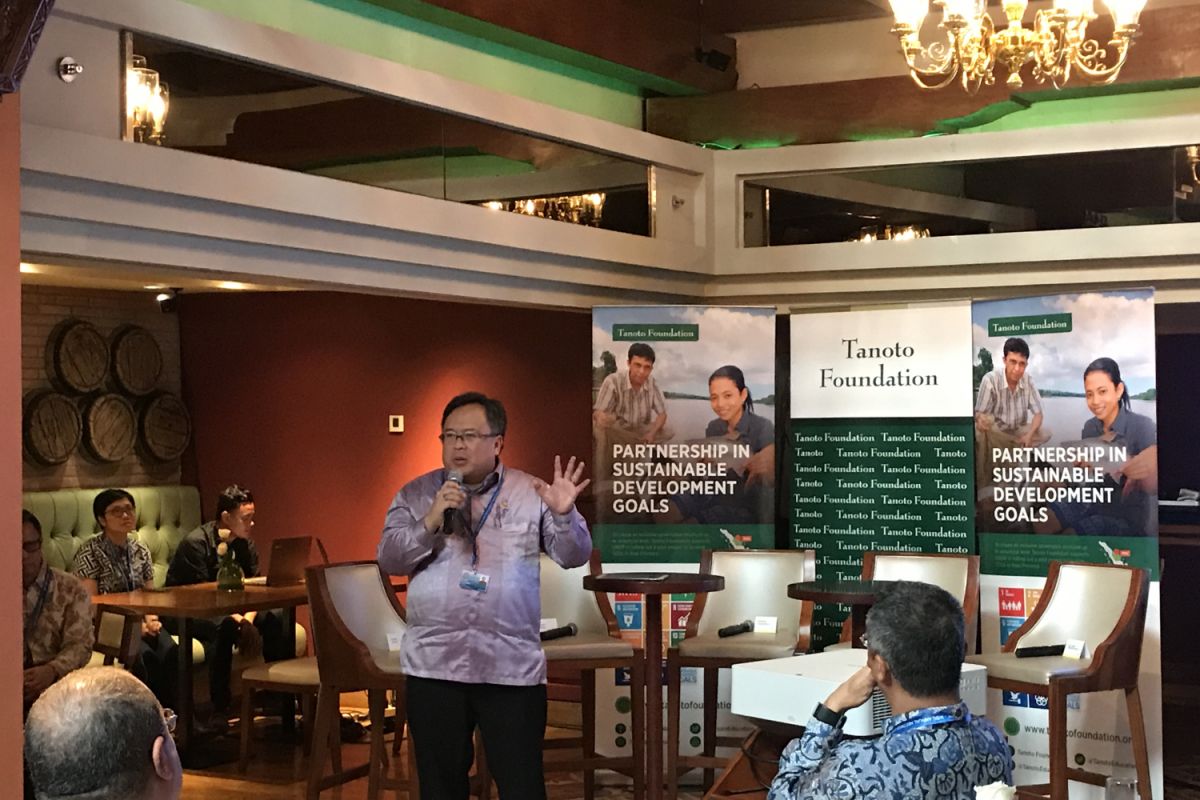In the forum titled Making the SDGs Everyone`s Business: Indonesia`s Private Sector Living the Global SDGs Agenda, held as part of the 2018 International Monetary Fund (IMF)-World Bank (WB) Group Annual Meetings at the Westin Resort Nusa Dua, Bali, on Tuesday, Minister of National Development Planning / Head of Bappenas Bambang Brodjonegoro, said that the business world can contribute to these projects using the Public Private Partnership (PPP) scheme on a national or regional scale.
"The opportunity to invest in the `green infrastructure` sector in Indonesia is very wide open; for example, in the fields of transportation, energy, water, waste management, and other environmental assets," he noted.
He added that currently there are several options to invest in this green infrastructure, such as green bonds, green sukuk, and blended finance, and all three are very relevant to the social and environmental impacts that will be created.
These businesses are related to Goal 7 of the SDGs, namely Access to Energy, Goal 11 Sustainable Development, and Objectives 9 of Industry, Innovation, and Infrastructure.
In addition, Indonesia has also developed a Partnership for Indonesia Sustainable Agriculture (PISAgro) cooperation scheme related to Objective 8 Decent Work and Economic Growth, Objective 10 Reducing Inequality, Goal 1 without Poverty, and Objectives of 17 Partnerships to Achieve Goals, he remarked.
The scheme has succeeded in realizing 20 private companies, banks, international organizations, civil society organizations, cooperatives, and around 500 thousand farmers who are supported by the local government.
"The PISAgro scheme has also increased productivity by 12 to 71 percent, equivalent to 400 thousand hectares of agricultural land and raised revenues by 15 to 80 percent, while private companies benefit from better agricultural products and sustainable supply," Brodjonegoro explained.
As an example of the implementation of sustainable business in Indonesia, the Ministry of National Development Planning / Bappenas has just launched the construction of a Micro Hydro Power Plant (PLTMH) in Jambi Province using a blended finance scheme.
The MHP is designed to provide electricity access for four remote villages, with 803 households and 4,448 people.
The plant is the result of cooperation between the Ministry of Energy and Mineral Resources (ESDM), the National Zakat Agency (BAZNAS), Jambi Bank, and the United Nations Development Program (UNDP).
This type of cooperation will continue to be improved and have very good prospects, considering that according to the 2017 World Giving Index data, Indonesia has the title of the second most generous country.
"To improve the implementation of sustainable business, BAZNAS has just launched the Zakat Fiqh on SDGs, which acts as a guide for Muslim philanthropists to support TPB / SDGs.
Indonesia should be proud because the scheme is the first in the world and must be one of the main references for the people Muslim world to implement TPB / SDGs," he revealed.
Indonesia`s commitment in mainstreaming TPB / SDGs is realized through the Launch of the TPB / SDGs National Action Plan held in June 2018.
RAN SDGs is an effort that involves collaboration between government, civil society organizations, the private sector, philanthropy, and academia that together discuss the framework and joint efforts to achieve SDGs indicators, targets, and goals.
The NAP was funded from various sources, including domestic and international public and domestic and international private sectors.
There is also a potential for mixing between public and private funding, including international and domestic resources, by carrying out the principle of mutual cooperation for common goals.
Brodjonegoro emphasized that the TPB / SDGs are an ambitious commitment with 17 goals, 169 targets, and 244 indicators.
According to him, this requires a joint commitment to realize the ultimate global goal in alleviating poverty, protecting the earth, and ensuring everyone has the opportunity to experience world peace and prosperity that is synergic with nature.
TPB / SDGs should not only be seen as a challenge but also as an opportunity.
Furthermore, Unilever CEO Paul Polman pointed out that business with sustainable principles has the potential to generate US$12 trillion and create 380 million jobs, so that TPB / SDGs are the biggest opportunities for prosperity.
In its implementation, TPB / SDGs create business opportunities.
For example, food security issues open opportunities for sustainable aquaculture, the food industry for low-income people, large-scale agricultural technology, and urban agriculture.
This business line is relevant to Goal 1: Without Poverty, Goal 2: Without hunger, and Goal 3: Healthy and Prosperous Life. Another example is an effort to reduce waste, which is a business opportunity for micro irrigation, reducing food waste, changing diet, and restoring degraded areas.
These efforts are relevant to Goal 12: Responsible Consumption and Production, Goal 14: Ocean Ecosystems, Goal 15: Land Ecosystems, and Goal 17: Partnerships to Achieve Goals.
Reporter: Eliswan Azly
Editor: Fardah Assegaf
Copyright © ANTARA 2018












